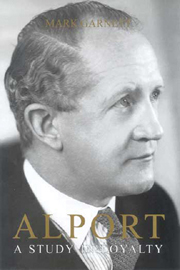Book contents
- Frontmatter
- Contents
- Acknowledgements
- Foreword
- Introduction
- 1 Father and Son
- 2 A National Faith
- 3 “Love and War”
- 4 Reviving Conservatism
- 5 “One Nation”
- 6 Early Postings
- 7 “Political Suicide”
- 8 “More Trouble with the Government, Daddy?”
- 9 A Freelance Diplomat
- 10 Gains and Losses
- Notes
- Bibliography
- Index
- Plate section
Foreword
- Frontmatter
- Contents
- Acknowledgements
- Foreword
- Introduction
- 1 Father and Son
- 2 A National Faith
- 3 “Love and War”
- 4 Reviving Conservatism
- 5 “One Nation”
- 6 Early Postings
- 7 “Political Suicide”
- 8 “More Trouble with the Government, Daddy?”
- 9 A Freelance Diplomat
- 10 Gains and Losses
- Notes
- Bibliography
- Index
- Plate section
Summary
Cub Alport was one of the select group whose work ensured that the Conservatives of my generation could declare their faith with pride. In the late 1950s university students such as myself rarely heard the tired old allegation that we were supporters of a “stupid party”. The illustrious names of Butler, Macleod, Maudling and Powell acted as our shield, and although the full extent of Cub's contribution was less well known to us at the time we all knew that he belonged in that company. We were rather proud that four of these Conservative thinkers belonged to our own university of Cambridge, and that Cub, like Butler, had served as President of the Union.
Thanks to Mark Garnett's painstaking research we can now appreciate that the intellectual revival of the Conservative Party after 1945 owed as much to Cub as to anyone else, with the obvious exception of his mentor Rab Butler. Even before the Second World War he was working against the notion that Conservatives were uncaring, publishing a pamphlet (A National Faith) which laid down the main lines of postwar policy. After his wartime service in Africa he co-founded the Conservative Political Centre and saw through the press many tracts which developed his idea of a party that put the national interest above class prejudice of any kind. Elected to Parliament in 1950, he was the key figure in the creation of the “One Nation” group that symbolised and cemented the new image in the party of Winston Churchill and Harold Macmillan.
- Type
- Chapter
- Information
- AlportA Study in Loyalty, pp. xi - xviPublisher: Acumen PublishingPrint publication year: 1999



